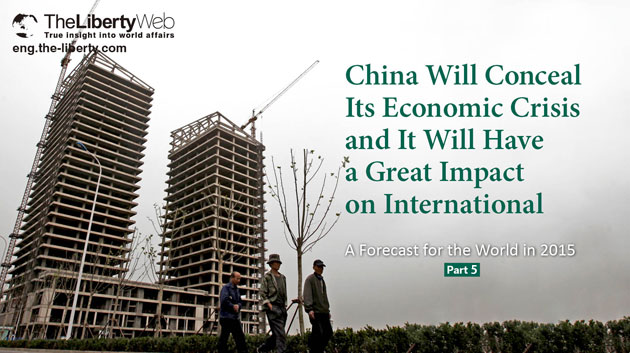China’s Economic Crises Will Seriously Have an Effect on Japan
A Forecast for the World 2015 (Part 5)
Construction in commercial areas of Tianjin has been under way, but newly built-up areas have become desolate ghost towns, one after another, where wild animals roam through vacant or half-built buildings. (photo: imaginechina/aflo)
Growing Uncertainties Regarding the Future of China’s Economy
China has been called the “world’s factory” and has achieved rapid economic growth, but its economy has recently started to show signs of slowdown. Let us take a look at the limitations that China will face due to its unusual political and economic systems.
In 2010, China announced that its nominal GDP outpaced that of Japan in 2010. Four years after its announcement, China’s GDP doubled Japan’s, and analysts have estimated that it will exceed the U.S.’s GDP at its current rate of growth in the next several years.
Yet, China’s economy has been significantly slowing down. In fact, its third-quarter GDP growth rate was 7.3%, the lowest level since the Lehman Brothers bankruptcy triggered a global financial crisis in 2008. There are growing concerns over whether China can continue to develop as before.
China’s Local Government Debt Is Larger than Its GDP
China has a big “time bomb” waiting to go off―its local government debt problems. The construction of apartment buildings by the local governments has contributed to China’s recent booming economy. As a result, property investment in China has accounted for nearly half of its GDP. This ratio is more than twice that of Japan, which means that China has an unusual economic structure.
What is worse, when officials in local governments have owed money to the public, they’ve advanced reckless public works project because they believed that even if their debts piled up, they could still get ahead in political circles as long as they boosted their provincial GDPs by spending more and more money.
In reality, however, most of the apartments have remained vacant, which has turned the newly built-up areas into ghost cities one after the other. The local governments have failed to recover the money they’ve spent on development, and they’re running up massive debts. Some analysts say that China’s total amount of the debt has exceeded the nation’s GDP of 900 trillion yen.
Private firms would never manage their businesses in such a slipshod manner because they know that they’d go bankrupt before being able to run up such huge amounts of debt. The problems of China’s local governments point to a failure in the planned, government-controlled, socialist economy.
If the local governments fail to pay back their large amounts of debt, they will have to stop the real estate development that accounts for a large percentage of China’s GDP, causing the public to lose the money that it has invested. If that happens, China’s economy will rapidly contract.
China’s State-Owned Enterprises Are Also Causing Economic Malaise
There are other weak points of China’s economy. So far, China has achieved economic development by having foreign businesses build plants, by learning skills from developed countries, and by using cheap labor. However, it’s now gaining on developed countries in terms of technology and showing increases in wages. In order for China to grow further, it needs to make a shift from an “economy of a developing nation” that makes products at lower prices to a “developed-world economy” that generates new ideas and products.
However, China does not have companies with their own technological expertise like the Japanese auto maker, Toyota, or the U.S. computer software giant, Microsoft. Chinese internet-based companies like the Alibaba group and Baidu just emulate U.S. internet business models.
China has apparently introduced a free market economy, but the state-owned companies have been monopolizing key industries such as telecommunications, energy, banking, and other sectors. The government has been giving state-run companies preferential treatment in terms of finance and regulations, which has prevented the private-sector from entering those areas.
State-run companies that have no competitors are not motivated to create new products and services, and China is maintaining its de facto, centrally-planned economy. Despite partially developing the economy with free competition, the government still controls a large share of the country’s economic output.
State Control of Information Does Not Generate Wealth
Information and thought control is another China’s weak point. Education that encourages people to conduct unrestricted discussion and research, and environments where people can exchange information freely, produce entrepreneurs and scientists who can develop an economy. This setting has a name; it’s called the “marketplace of ideas”.
In China, the government places universities under state control, and it allows them to conduct nothing but research in accordance with national projects, which is in a sharp contrast to the U.S. free economy, which Silicon Valley represents well. Furthermore, Chinese people aren’t able to use Facebook and Google, and they could even get arrested if they convey opinions that are unfavorable toward the government.
The freedom to exchange information and ideas, and the freedom to carry out research, are sources of wealth. The Chinese government deprives its people of such freedoms, and this very situation is the Achilles heel of China’s economy.
With the current political and economic systems, in which the government controls the economy and deprives its people of their freedoms, it will be difficult for China to expect further economic development.



















